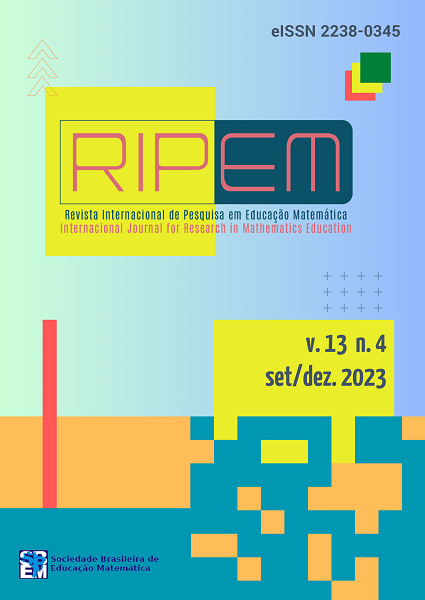The mobilization of emotions, moral commitment, and political commitment as dimensions of the movement for the constitution of the professional identity of prospective Mathematics teachers: the Supervised Teaching Practice
DOI:
https://doi.org/10.37001/ripem.v13i4.3626Palavras-chave:
Mathematics Education, Mathematics Teacher Education, Professional Identity, Emotions, Moral Commitment, Political CommitmentResumo
This paper analyzes the actions of prospective teachers (PT) associated with emotions, moral commitment, and political commitment that promoted the movement of the constitution of the professional identity (PI) of prospective mathematics teachers (PMT). This study focused on the nine PMTs’ reflections manifested in their final practicum reports and discussions, in the formative context, about the practicum. Given the information, we discuss the mobilization of emotions, moral commitment, and political commitment of the PMTs as dimensions of the movement for the constitution of the PIs of the nine PMTs: Performance during practicum; Practicum planning; Characteristics of students and class; Contextual characteristics that influenced the development of the practicum; Practicum supervision. The actions that promoted this movement were: Considering the role of mathematics in education; Sharing experiences, frustrations, and expectations; Realizing limitations; Reasoning about school routine and planning; Sharing information about nervousness and the desire to be well evaluated. Such actions reveal evidence of the promotion of the movement for the constitution of the PIs of the PMTs. Recognizing and analyzing the mobilization of emotions, moral commitment, and political commitment as dimensions of the PI constitution movement helps us understand the education of the PMTs in its complexity, specifically in the Brazilian scenario.
Downloads
Referências
Barbosa, C. P. & Lopes, C. E. (2020). Um estudo sobre a identidade profissional de futuros professores de Matemática no Estágio Curricular Supervisionado. Educação Matemática Debate, 4(10), 1-24.
Cribbs, J.; Tassell, J.; Hazari, Z.; Sadler, P. M. & Sonnert, G. (2022). Unpacking Mathematics Identity: Exploring Undergraduate Students’ Enduring Experiences. Revista Internacional de Pesquisa em Educação Matemática, 12(2), 68-91.
Cyrino, M. C. C. T. (2016). Mathematics teachers’ professional identity development in communities of practice: reifications of proportional reasoning teaching. Boletim de Educação Matemática, 30(54), 165-187.
Cyrino, M. C. C. T. (2017). Identidade Profissional de (futuros) Professores que Ensinam Matemática. Perspectivas da Educação Matemática, 10(24), 699-712.
Cyrino, M. C. C. T. (2021). Ações de Formação de Professores de Matemática e o Movimento de Construção de sua Identidade Profissional. Perspectivas da Educação Matemática, 14(35), 1-26.
Darragh, L. & Radovic, D. (2019). “To Tia with loveâ€: Chilean mathematics teacher identities after professional development. ZDM Mathematics Education, 51(3), 517-527.
Darragh, L. (2016). Identity research in mathematics education. Educational Studies Mathematics, 93(1), 19-33.
Day, C. & Gu, Q. (2007). Variations in the conditions for teachers' professional learning and development: Sustaining commitment and effectiveness over a career. Oxford Review of Education, 33(4), 423-443.
De Paula, E. F. & Cyrino, M. C. C. T. (2017). Identidade profissional de professores que ensinam Matemática: panorama de pesquisas brasileiras entre 2001-2012. Zetetiké, 25(1), 27-45.
De Paula, E. F. & Cyrino, M. C. de C. T. (2021). Identidade profissional de professores que ensinam matemática: Elementos e ações para a construção de uma proposta para futuras investigações, Pro-Posições, 32, 1-25.
Hodgen, J. & Askew, M. (2007). Emotion, identity and teacher learning: becoming a primary mathematics teacher. Oxford Review of Education, 33(4), 469-487.
Jones, A. L. & Kessler, M. A. (2020). Teachers' Emotion and Identity Work During a Pandemic. Frontiers in Education, 5, 1-9
Kelchtermans, G. (2009). Who I am in how I teach is the message: self-understanding, vulnerability and reflection. Teachers and Teaching: theory and practice, 15(2), 257-272.
Keskin, A. & Zaimoğlu, S. (2021). An Investigation of Turkish EFL Teachers’ Perceptions of Professional Identity. Çağ Üniversitesi Sosyal Bilimler Dergisi, 18(1), 82-95
Kwon, S.; Kim, W.; Bae, C.; Chi, M.; Lee, S. & Dreamson, N. (2021). The identity changes in online learning and teaching: Instructors, learners, and learning management systems. International Journal of Educational Technology in Higher Education, 18(1), 67.
Lasky, S. (2005). A sociocultural approach to understanding teacher identity, agency and
professional vulnerability in a context of secondary school reform. Teaching and Teacher Education, 21(8), 899-916.
Lutovac, S. & Flores, M. A. (2021). ‘Those who fail should not be teachers’: Pre-service Teachers’ Understandings of Failure and Teacher Identity Development. Journal of Education for Teaching, 47(3), 379-394.
Meyer, C.; Losano, L. & Fiorentini, D. (2022). Modos de conceituar e investigar a identidade profissional docente nas revisões de literatura. Educação e Pesquisa, 48, 1-19.
Polizzi, S. J.; Zhu, Y.; Reid, J. W.; Ofem, B.; Salisbury, S.; Beeth, M.; Roehring, G.; Mohr-Schroeder, M. J.; Sheppard, K. & Rushton, G. T. (2021). Science and mathematics teacher communities of practice: social influences on discipline-based identity and self-efficacy beliefs. International Journal of STEM Education, 8(30), 1-18.
Snook, A.; Schram, A. B.; & Arnadottir, S. A. (2022). “I am a teacher†— exploring how to support teacher identity formation in physical therapists. Physical Therapy Reviews, 27(1), 73-80.
Søreide, G. (2006). Narrative construction of teacher identity: positioning and negotiation. Teacher and teaching, 12(5), 527-547.
Suarez, V. & McGrath, J. (2022). Teacher professional identity: How to develop and support it in times of change. OECD Education Working Papers, 267, 1-46.
Teixeira, B. R. & Cyrino, M. C. C. T. (2015). Desenvolvimento da Identidade Profissional de Futuros Professores de Matemática no Âmbito da Orientação de Estágio. Boletim de Educação Matemática, 29(52), 658-680.
Publicado
Como Citar
Edição
Seção

Este trabalho está licensiado sob uma licença Creative Commons Attribution-NonCommercial-ShareAlike 4.0 International License.








